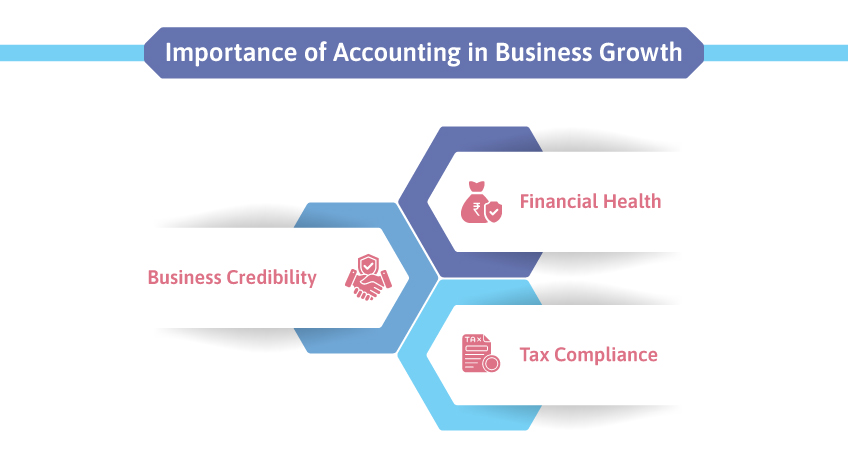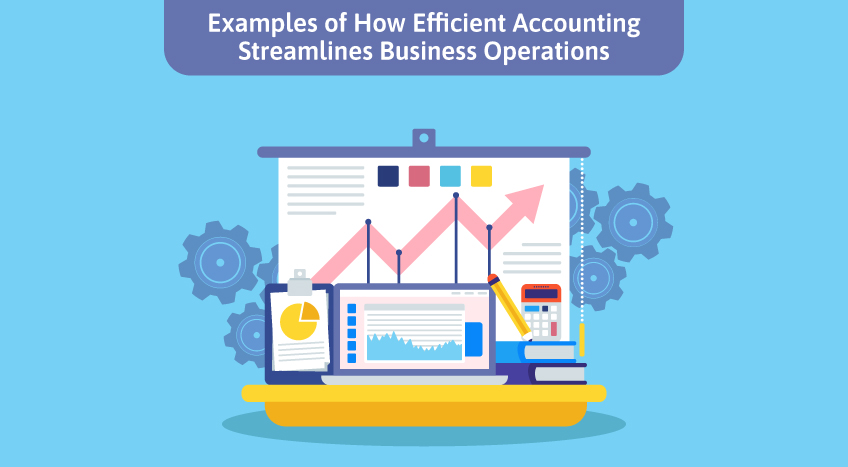Accounting goes beyond statistics and financial records. Your company's financial knowledge and decision-making depend on it. Proper accounting methods reveal profitability, cash flow, compliance, and growth potential from transaction data.
Accurate and timely accounting reveals your business's actual drivers. This lets you make strategic choices about operations, budgets, investments, and long-term planning using facts rather than guessing. Accounting gives the analytical capacity to optimize finances and maximize growth.
A business owner with a fundamental understanding of accounting can better understand the company's financial well-being and operational effectiveness. You can discern lucrative business sectors, reduce expenses, establish ideal pricing strategies, effectively oversee cash flow, and formulate wise investment choices. Let's understand accounting and how to harness its potential to optimize the financial operations of your business.
Accounting for businesses: an overview
Businesses record, summarize, and report their financial transactions via accounting. It extends beyond accounting. The double-entry system, where Assets = Liabilities + Equity, debits and credits two accounts for every transaction.
Accounting generates three financial statements: the income statement displays revenues and costs over time, the balance sheet shows assets, liabilities, and equity at a given moment, and the cash flow statement monitors cash inflows and outflows.
These figures show profitability, cash position, operational efficiency, and financial health. Business leaders use financial intelligence to make operational, pricing, growth, investment, and finance choices.
Bookkeeping just records transactions, while accounting creates a complete financial picture of the organisation. Understanding basic accounting concepts helps entrepreneurs evaluate their company's finances and plan expansion.
How accounting helps you understand your business's financial position
- Accounting provides a clear window into a business's financial position and performance by comprehensively documenting all transactions.
- Key reports generated:
-
- The income statement shows revenues and allows for the tracking of income trends over time.
- The expense statement categorizes costs like salaries, rent, and supplies to identify high-spend areas.
- The cash flow statement depicts cash inflows, outflows, and liquidity positions.
- The balance sheet captures assets, liabilities and equity at a given point.
- Together, these statements create a financial dashboard offering real-time visibility into the company's fiscal health.
- Precise accounting acts as the foundation for data-driven decision-making to foster growth and profitability, akin to a medical diagnosis guiding treatment.
- Effectively monitoring and improving financial well-being through diligent accounting is critical for business success.
Importance of accounting in business growth
From budget planning to business performance assessment, knowing the fundamentals of accounting helps you effectively manage and balance every aspect of your business.

The importance of accounting in business growth can be better learned by understanding its role in:
Unveiling the financial health of your business
Accounting offers profound insights into the financial position and performance of a business, which are the two most important indicators of its health. By generating financial statements and recording transactions, monitoring and managing the fiscal vitals for expansion is possible.
- Ensuring a healthy financial pulse: Cash flow ensures a business has sufficient liquid assets to finance operations and expansion. Accounting provides complete insight into currency inflows and outflows via financial indicators such as the cash flow statement. This facilitates cash requirement forecasting, prevents disruptive cash shortages, and ensures financial sustainability.
Building trust with stakeholders
Accounting is the foundation for dependable financial reporting, inspiring confidence in the opinions of stakeholders such as regulators, banks, and investors. This facilitates opportunity acquisition and bolsters the company's credibility.
- Enhancing credibility in the business world: Financial statements that have been audited and certified by reputable accountants indicate a company's integrity and reliability. Lenders and investors are more likely to allocate their capital and confidence to companies that employ accounting practices that foster confidence.
Tax compliance made easy
Ensuring accurate accounting documentation is crucial for businesses to maintain tax compliance, minimize penalties, and maximize tax outflows.
- Navigating the maze with accounting: Complicated business taxes can become a source of concern in the absence of conscientious accounting. Effective tax filing requires accurate, efficient, and audit-proof records of taxable income, deductibles, credits, and more.
Examples of how efficient accounting streamlines business operations

- Leading retail Coffee Stores utilize their accounting data on revenue patterns and profitability metrics across locations to identify top-performing stores for replication and underperformers for reassessment - optimizing returns on their retail investments.
- Leading e-Commerce Service Providers closely monitor the cash conversion cycle metric, using accounting visibility into real-time receivables collection and inventory turnover to efficiently convert inventory into cash - facilitating excellent working capital management that has fueled their growth.
- Leading Multinational Consumer Goods companies with over €200 billion in annual revenue, relies on precise cost accounting data at the granular stock-keeping unit level to manage profitability across its over 20,000 SKUs. This data is critical for effective cost management and pricing decisions at massive scale.
Like these industry giants, small businesses can also institutionalize data-driven, accounting-based decision-making processes to reliably steer the company toward operational efficiencies, growth and success.
Wrapping Up
The saying "What gets measured, gets managed" applies to accounting's impact on corporate performance. Accurate accounting gives measures for controlling profitability, growth, cash flow, compliance, and strategic decision-making.
Business owners profit from learning this crucial skill. While manual procedures were previously adequate, advanced activities require automated accounting.
Comprehensive software like Tally Solutions automates monotonous operations and provides detailed analytics. By using advanced accounting solutions like Tally, you can turn your organization into a successful, high-performance corporation. Use the correct accounting system and methods to boost your money management.

















